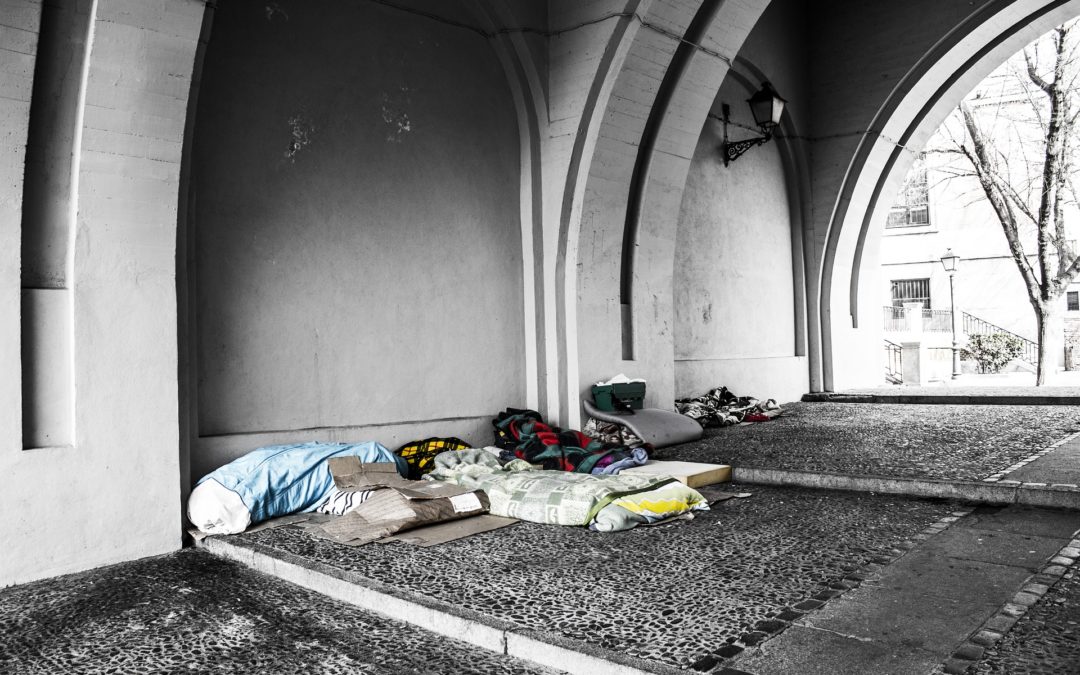by Susie Gamelin—
We had just settled into our circle of chairs for a discussion about homelessness when the woman on my left decided to set the agenda for our conversation. “Those people are nothing but drunks and addicts who sleep on the sidewalks in broad daylight and trash everything. It’s disgusting,” she announced. Her stern voice told us that there was nothing more to discuss. Theoretically I was the discussion leader. I had been asked by our pastors to lead a conversation about this topic because my heart has been drawn to people experiencing homelessness for as long as I can remember.
There was a time in my family’s life when we were homeless. My mom and dad had put every penny they had into a small town restaurant and bowling alley. All of us, Grandma and Grandpa included, lived in a space that Dad had carved out behind the bowling alley. Dad and Mom worked hard from pre-dawn to after-dusk. The venture wasn’t a success. After two years they had $25 left in their pockets. That wouldn’t last long, and we had to divide up to live. My mom, sister and I went to our grandparents’ summer cottage for a few months. Eight-year-old me thought that was a great vacation! My dad stayed with our other grandparents in the city, where he got his old job back and saved money until he was able to rent a place for all of us in a slightly shabby neighborhood. We climbed back out of that hole. Slowly. Since that time I’ve believed that, with just a few changes in my life, I might be among those searching tonight for a safe place to sleep.
I had prepared for the class that Sunday morning. I had researched the whos, whys and whats of homelessness to make sure that what I had learned on the streets was accurate. After my sister to my left had said her piece, I began by asking about the whys that lead people to experience homelessness. It turns out that the number one reason is the lack of affordable housing. The second reason is the preponderance of only low paying jobs available for folks who haven’t been employed for awhile. Furthermore, how can people on the streets apply for those jobs without transportation, child care, an address, the right clothing, and the means to stay clean? The third reason for homelessness is generational poverty, and its legacy of a lack of confidence, low expectations and little education. Poverty prompts destructive “isms.” The fourth, fifth and sixth reasons why men and women are homeless is that they often experience mental illness, addiction and alcoholism without adequate resources to help recover. LGBTQ+ people who are targets for bullying and domestic violence are especially vulnerable as they try to find safety. Why do people sleep in public places throughout the day? Because night’s darkness is dangerous for body, mind and possessions, and attempts to sleep can be futile.
I set out to talk about these matters with the circle I sat in. I discovered new ideas from class members and was grateful for their willingness to stick with previously unexplored topics like generational poverty. We told tender and awful stories about people on the streets whom we knew, in order to put flesh and blood on the facts. But our sister on my left interrupted time and time again to declare that those people were reprehensible, that they liked being homeless, and that they wouldn’t even try to better themselves. We listened. We told her that we heard her opinions. But we disagreed.
When worship began after class, it was healing for all of us. We gathered in the worship space, shared the Lord’s peace with her and each other, and formed a circle around the altar to receive again the gift of Jesus’ broken body and poured out blood, for everyone. Our sister didn’t return to class session two the next Sunday, but she was there with us for worship.
That’s all right. It’s okay not to agree about even important matters. It can even be a relief to agree that we disagree. Will our facts and figures, experiences and books convince folks who don’t agree with us to change their minds? Probably not. Indeed, as we reach the later years of our lives we may settle ever more solidly into what we’ve always thought. New evidence be darned. Of course, there are older folk who are exceptions. All of us are called to be deeply upset about the beliefs others use to humiliate and even destroy their targets. Unlike the differences of opinion that are expressed at virtually every church forum, brutally demeaning others can lead to hatred, bullying and emotional, spiritual and physical violence. It must be stopped. There is no doubt about that.
The Rev. Susie Gamelin and her husband, Tim, live in Colorado. A retired ELCA pastor, she understands that her call is to wash the feet of those who are weary, confused, addicted and/or lonely.
This article is excerpted from the June 2020 issue of Gather magazine. To read more like it, subscribe to Gather..
Who dies by suicide?
By Elise Seyfried Statistics indicate that a person who dies by suicide is most likely to be a...
Take the first step
Help create a safer world for kids. Did you know that the number of children and teens killed by...
Emergence
By Elise Seyfried SOMETIMES, DURING WORSHIP, we are asked to remember our baptism. We watch the...





